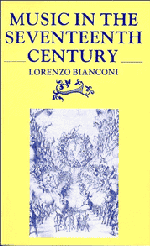IV - OPERA
Published online by Cambridge University Press: 01 June 2011
Summary
The historiography of opera
For Italy, as for Europe as a whole, the most remarkable innovation of the entire seventeenth century was without doubt the introduction of opera. The sheer enormity of this ‘invention’ may be gauged in relation to the complexity of its constituent parts: no other form of contemporary artistic expression brings together such numerous, varied and costly means of organization and production. Moreover, the history and fortunes of opera are at all times deeply rooted in historical and social events: conditioned as it is by the various prevailing economic and political situations, opera has been and continues to be exploited as a not insignificant tool of ideological persuasion and mobilization, a public demonstration of sovereign power, a means of collective entertainment, a vehicle for the community celebration of civic events.
Down the centuries, the introduction of opera has had enormous repercussions: in Italy, France, England and German-speaking lands, modern operatic life is nothing but the continuation of an institutional tradition which, despite constant transformation (not least in the emergence of many non-European operatic capitals – New York, San Francisco, Buenos Aires, Sydney, etc. – in the course of the twentieth century), can be traced without interruption through three centuries of history.
- Type
- Chapter
- Information
- Music in the Seventeenth Century , pp. 161 - 264Publisher: Cambridge University PressPrint publication year: 1987
- 1
- Cited by



